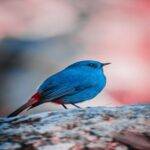The Curious Habit of Birds: Why Do Birds Eat Rocks?
Birds Eat Rocks, the curious habit of birds eating rocks is called geophagy. It is a common practice among many bird species, especially those that eat hard-shelled seeds or nuts. The rocks help to grind down the food in the bird’s gizzard, which is a muscular organ that helps to digest food.

Here are some of the reasons why birds eat rocks:
- To help with digestion. As mentioned earlier, birds do not have teeth, so they need to find other ways to break down their food. The rocks in the gizzard help to grind down the food, making it easier for the bird to digest.
- To provide minerals. Some rocks contain minerals that are essential for birds’ health, such as calcium and phosphorus. By eating rocks, birds can get these essential nutrients.
- To regulate body temperature. Some birds, such as chickens, eat rocks to help regulate their body temperature. The rocks absorb heat from the bird’s body, helping to keep it cool.
- To attract mates. In some bird species, males will eat rocks to attract mates. The males believe that the rocks make them look stronger and more attractive.
Not all birds eat rocks. Some bird species, such as hummingbirds and warblers, have soft-bodied diets that do not require the help of rocks to digest. However, many other bird species, such as chickens, ducks, and geese, regularly eat rocks.
If you see a bird eating rocks, there is no need to worry. It is a perfectly normal behavior for many bird species. However, if you notice that a bird is eating an excessive amount of rocks, or if the rocks seem to be making the bird sick, you should contact a veterinarian.
Here are some additional things to keep in mind about birds eating rocks:
- The type of rock that a bird eats can vary depending on the species. Some birds prefer smooth, rounded rocks, while others prefer sharp, jagged rocks.
- The size of the rocks that a bird eats can also vary. Some birds only eat small pebbles, while others will eat rocks that are the size of their head.
- The amount of rocks that a bird eats can also vary. Some birds only eat a few rocks per day, while others will eat dozens of rocks.
Unearthing the Mystery: A Closer Look at Birds and Their Rock-Eating Behavior
The phenomenon of birds eating rocks is a curious one that has puzzled scientists for centuries. While it is now well-established that this behavior is widespread among birds, the exact reasons why they do it are still not fully understood.
One of the most common theories is that birds eat rocks to help them digest their food. Birds do not have teeth, so they rely on their gizzards to grind up their food. The rocks in the gizzard act like teeth, helping to break down the food into smaller pieces that can be more easily digested.

Another theory is that birds eat rocks to get the minerals they need. Some rocks contain minerals that are essential for birds, such as calcium and magnesium. By eating rocks, birds can get these essential nutrients without having to rely on their diet alone.
Still another theory is that birds eat rocks to help them stay hydrated. When birds swallow rocks, the rocks help to absorb water in the digestive tract. This can be especially important for birds that live in dry environments.
It is likely that the reason why birds eat rocks is a combination of all of these factors. The specific reasons may vary depending on the species of bird and its environment.
In addition to the theories mentioned above, there are a few other possible reasons why birds might eat rocks. For example, some birds may eat rocks to help them balance or to make themselves feel full. Others may eat rocks out of boredom or curiosity.
Whatever the reason, the behavior of birds eating rocks is a fascinating one that continues to intrigue scientists.
Here are some additional interesting facts about birds and their rock-eating behavior:
- Not all birds eat rocks. Only birds that eat hard-shelled foods, such as seeds and nuts, are known to do this.
- The size and shape of the rocks that birds eat vary depending on the species of bird. Some birds swallow small pebbles, while others swallow larger rocks.
- Birds usually swallow the rocks whole. However, some birds may crush the rocks before swallowing them.
The rocks that birds eat are usually smooth and rounded. This is because the rocks are polished by the rubbing action of the gizzard. - The rocks that birds eat can stay in their gizzards for months or even years.
- The rocks that birds eat help to keep their gizzards healthy. The rocks help to grind up food and to remove toxins from the digestive tract.
Best Bird Baths For Hummingbirds In 2023
Rock Consumption in Avian Diet: What’s the Reason Behind It?
The scientific term for rocks that birds eat is grit. Grit is a mixture of small stones, sand, and gravel. Birds eat grit for a variety of reasons, including:

- To help grind up food. The gizzard is a muscular organ in the bird’s digestive system that helps to grind up food. Grit helps to break down food particles and make them easier to digest.
- To provide essential nutrients. Some rocks, such as oyster shells, are a good source of calcium. Calcium is essential for birds, especially for the formation of strong eggshells.
- To absorb toxins. Some rocks can help to absorb toxins from the bird’s diet. This is especially important for birds that eat insects, which can contain toxins.
- To help with digestion. Grit can help to keep the bird’s digestive system healthy by stimulating peristalsis, the rhythmic contractions that move food through the digestive tract.
The amount of grit that a bird needs to eat depends on the species of bird and its diet. Some birds, such as chickens, need to eat a lot of grit, while others, such as songbirds, need less.
It is important to note that not all rocks are safe for birds to eat. Some rocks can be harmful to birds, so it is important to choose grit that is specifically designed for birds.
Here are some of the rocks that are safe for birds to eat:
- Oyster shells
- Sand
- Gravel
- Limestone
- Flint
- Chert
It is also important to avoid giving birds rocks that are too large, as these can pose a choking hazard. The rocks should be small enough to fit through the bird’s beak and be easily swallowed.
Birds and Minerals: Exploring the Role of Rocks in Their Lives

- Birds need minerals for their health. Many minerals are essential for birds, including calcium, phosphorus, iron, zinc, and copper. These minerals are needed for a variety of bodily functions, such as bone formation, blood clotting, and feather growth. Birds can get minerals from their diet, from supplements, or from chewing on rocks.
- Some birds use minerals to build their nests. Some birds, such as swallows and mud daubers, use mud to build their nests. They often add sand, gravel, or other small rocks to the mud to make it stronger.
- Some birds use minerals to attract mates. Male bowerbirds build elaborate nests out of sticks, leaves, and other materials. They often decorate their nests with brightly colored minerals, such as shells, beads, and crystals. This helps them to attract mates.
- Some birds use minerals to defend themselves. Some birds, such as woodpeckers, use their beaks to peck at rocks. This helps them to break open food sources, such as insects and nuts. It can also be used as a defense against predators.
- Some birds use minerals to navigate. Some birds, such as homing pigeons, use the Earth’s magnetic field to navigate. They may use minerals in their bodies to help them sense the magnetic field.
These are just a few of the ways that birds and minerals interact. The relationship between birds and minerals is complex and fascinating, and scientists are still learning more about it.
The amount of minerals that a bird needs depends on its species, age, and activity level. However, some of the most important minerals for birds include calcium, phosphorus, iron, zinc, and copper. Calcium is needed for strong bones and eggshells. Phosphorus is needed for energy metabolism and cell growth. Iron is needed for blood formation. Zinc is needed for wound healing and immune function. Copper is needed for melanin production and nerve function.
They often add sand, gravel, or other small rocks to the mud to make it stronger. This helps to prevent the nest from collapsing. Swallows are another type of bird that uses mud to build its nests. They often add small pebbles to the mud to help it adhere to the walls of a cliff or building.
Male bowerbirds are known for their elaborate nests. They often decorate their nests with brightly colored minerals, such as shells, beads, and crystals. This helps them to attract mates. The minerals may also serve as a status symbol, showing that the male is able to provide for his mate and offspring.
Woodpeckers use their beaks to peck at rocks. This helps them to break open food sources, such as insects and nuts. It can also be used as a defense against predators. When a predator approaches, the woodpecker may peck at the ground or a tree trunk. This can make a loud noise that startles the predator and gives the woodpecker time to escape.
Rocks as Dietary Supplements for Birds: A Surprising Revelation
Rocks are not dietary supplements for birds in the same way that vitamins or minerals are. Birds do not eat rocks for their nutritional value. Instead, they eat rocks to help them digest their food and to get the minerals they need.
The small stones and grit that birds eat are called gastroliths. Gastroliths help to grind up food in the bird’s gizzard, which is a muscular organ that helps with digestion. The grit also helps to break down bones and seeds, which can be difficult for birds to digest.

In addition to helping with digestion, gastroliths also provide birds with essential minerals, such as calcium, iron, and magnesium. These minerals are important for the bird’s overall health, including its bones, feathers, and immune system.
So, while rocks are not dietary supplements in the traditional sense, they do play an important role in the health of birds. Without gastroliths, birds would have difficulty digesting their food and getting the minerals they need.
Here are some of the benefits of rocks as dietary supplements for birds:
- Help with digestion
- Provide essential minerals
- Prevent constipation
- Improve the absorption of nutrients
- Strengthen bones and feathers
- Boost the immune system
If you are a bird owner, you can provide your bird with gastroliths by placing a small dish of gravel or sand in its cage. The size of the rocks should be small enough that the bird can swallow them without choking.
It is important to note that not all rocks are safe for birds to eat. Some rocks, such as those that contain lead or other toxic substances, can be harmful to birds. It is always best to consult with a veterinarian before giving your bird any rocks to eat.
The Geological Connection: Understanding Why Birds Ingest Rocks
The geological connection between birds and rocks is the fact that birds often ingest rocks to help them digest their food. This is called gastrolithiasis, or the ingestion of stones. The rocks help to grind up the food in the bird’s gizzard, which is a muscular organ that functions like a stomach.

There are a number of reasons why birds might ingest rocks. One reason is that they help to break down hard-shelled foods, such as seeds and nuts. Another reason is that they help to absorb nutrients from the food. Rocks also help to regulate the acidity of the bird’s stomach.
The type of rocks that birds ingest varies depending on the species of bird and its diet. For example, seed-eating birds tend to ingest small, smooth stones, while insect-eating birds tend to ingest larger, rougher stones.
The amount of rocks that a bird ingests also varies. Some birds only ingest a few rocks, while others may ingest dozens or even hundreds. The amount of rocks that a bird ingests also depends on the season. Birds that eat more hard-shelled foods in the winter may ingest more rocks than they do in the summer.
The ingestion of rocks is generally harmless to birds. However, if a bird ingests too many rocks, it can cause health problems, such as blockages in the digestive tract.
The geological connection between birds and rocks is a fascinating one. It shows how birds have adapted to their environment and found ways to use the resources around them to their advantage.
Here are some additional facts about the geological connection between birds and rocks:
- The oldest known evidence of gastrolithiasis is from a fossilized bird that lived about 150 million years ago.
- Some birds, such as ostriches, can ingest up to 1 kilogram of rocks in their lifetime.
- The rocks that birds ingest can help them to maintain a healthy weight.
- Birds that live in areas with few rocks may get their rocks from other sources, such as beaches or riverbeds.
Best Deer Proof Bird Feeder For Your Garden [2023]
Feathered Gastronomes: Delving into the Need for Rocks in Birds’ Diets
They come in all shapes and sizes, and they have a wide variety of diets. But did you know that many birds eat rocks?
That’s right, rocks! Birds don’t eat rocks for the same reason that humans do. They don’t get any nutritional value from them. Instead, birds eat rocks to help them digest their food.
This means that they have to swallow their food whole. But if they swallow their food whole, it can be difficult to digest. That’s where rocks come in.
When birds swallow rocks, the rocks go to the bird’s gizzard. The rocks help to grind the food into smaller pieces, which makes it easier for the bird to digest.
Not all birds eat rocks. Only birds that eat hard-shelled foods, such as seeds and nuts, need to eat rocks. These foods are difficult to digest, and the rocks help to break them down.
The amount of rocks that a bird needs to eat depends on its diet. Birds that eat a lot of hard-shelled foods will need to eat more rocks than birds that eat a softer diet.
Birds usually find the rocks they need to eat by pecking at the ground. They also sometimes eat sand or gravel.
The rocks that birds eat are usually small, about the size of a pea. But some birds, such as storks and pelicans, can eat rocks that are much larger.
The rocks that birds eat are not harmful to them. In fact, they are essential for the birds’ digestion. So next time you see a bird eating a rock, don’t be surprised.
Here are some additional facts about the role of rocks in birds’ diets:
- The rocks that birds eat are called gastroliths.
- Gastroliths can help to grind down food, absorb water, and regulate the bird’s body temperature.
- The size and shape of the gastroliths vary depending on the bird’s species and diet.
- Birds usually replace their gastroliths every few weeks.
A Nutritional Necessity or a Quirky Behavior? Decoding Birds and Rock Consumption
Decoding Birds and Rock Consumption” is a good way to frame the question of why birds eat rocks. On the one hand, it is well-established that rocks can help birds to digest their food. The gizzard, a muscular organ in the bird’s stomach, grinds up food with the help of rocks and grit. This is especially important for birds that eat hard-shelled seeds and nuts. Without rocks, these foods would be difficult to digest and could even cause the bird to choke.

On the other hand, not all birds eat rocks, and some birds that do eat rocks seem to do so in excess. For example, ostriches have been known to swallow rocks that are much larger than their stomachs. This suggests that there may be other reasons why birds eat rocks, such as to provide minerals or to help them feel full.
More research is needed to fully understand why birds eat rocks. However, it is clear that this behavior is not simply a quirky habit. Rocks play an important role in the digestion of many birds, and they may also provide other benefits.
Here are some of the specific reasons why birds eat rocks:
- To help with digestion. As mentioned above, rocks can help birds to grind up their food, especially hard-shelled seeds and nuts. This is especially important for birds that have a low-fiber diet.
- To provide minerals. Some rocks contain minerals that are essential for birds, such as calcium, magnesium, and iron. These minerals can help to keep birds healthy and strong.
- To help them feel full. Rocks can take up space in the stomach, which can help birds to feel full. This can be helpful for birds that are trying to lose weight or that are not getting enough food.
- To attract mates. In some species of birds, males that eat rocks are more attractive to females. This is thought to be because rocks are a sign of strength and health.
Geophagy in Birds: The Science Behind Swallowing Stones
It is a widespread behavior in the animal kingdom, and has been documented in many species of mammals, birds, reptiles, butterflies and isopods, especially among herbivores.
In birds, geophagy is most commonly seen in parrots, pigeons, and doves. The reasons for geophagy in birds are not fully understood, but there are several hypotheses. One hypothesis is that geophagy helps to detoxify the bird’s diet. Many plants contain toxins that can be harmful to birds, and geophagy may help to bind these toxins and prevent them from being absorbed into the bloodstream.
Another hypothesis is that geophagy helps to provide essential minerals. Some soils are rich in minerals that are important for bird health, such as calcium, sodium, and iron. Ingesting these minerals can help to prevent deficiencies and improve the bird’s overall health.
A third hypothesis is that geophagy helps to improve digestion. The gizzard is a muscular organ in the bird’s stomach that helps to grind up food. Ingesting small stones, known as gastroliths, can help to break down food and improve digestion.
It is also possible that geophagy serves a social function in birds. Some birds may learn to eat soil from their parents or other members of their flock. This behavior may help to strengthen social bonds and promote cooperation.
The specific reasons for geophagy in birds vary depending on the species and the environment. However, the behavior is likely to have evolved to provide some benefit to the bird’s health or survival.
Here are some specific examples of geophagy in birds:
- Parrots: Parrots are known to eat clay, especially when they are eating fruit that contains toxins. The clay helps to bind the toxins and prevent them from being absorbed into the bloodstream.
- Pigeons: Pigeons have been observed eating soil from termite mounds. The soil is rich in minerals, such as calcium and sodium, which are important for pigeon health.
- Doves: Doves have also been observed eating soil from termite mounds. The soil is thought to help to improve digestion and prevent parasites.
To Eat or Not to Eat Rocks: Investigating the Benefits and Consequences for Birds
The practice of birds eating rocks, also known as geophagy, is a widespread phenomenon that has been observed in over 100 species of birds. The reasons why birds eat rocks are not fully understood, but it is thought to be beneficial for their digestion in some way.
One theory is that rocks help to grind up food in the bird’s gizzard, which is a muscular organ that helps to break down food. This is especially important for birds that eat tough or hard-shelled foods, such as seeds, nuts, and insects. The rocks also help to absorb water from the food, which can help to prevent dehydration.
Another theory is that rocks help to provide minerals that are essential for the bird’s health. For example, some rocks contain calcium, which is important for the formation of bones and eggshells.
However, there are also some potential risks associated with geophagy. If a bird swallows too many rocks, it can lead to blockages in the digestive tract.
Overall, the benefits and risks of geophagy for birds are still being debated. More research is needed to understand the full implications of this practice.
Here are some specific examples of the benefits and consequences of geophagy in birds:
1. Benefits:
- Rocks can help to grind up food in the gizzard, which can improve digestion.
- Rocks can absorb water from food, which can help to prevent dehydration.
- Rocks can provide essential minerals, such as calcium.
2. Consequences:
- Swallowing too many rocks can lead to blockages in the digestive tract.
- Rocks can damage the lining of the gizzard.
- Rocks can harbor harmful bacteria.
It is important to note that not all birds that eat rocks do so for the same reason. Some species, such as parrots, seem to eat rocks for the minerals they contain. Others, such as chickens, may eat rocks simply because they are available.
The decision of whether or not to eat rocks is ultimately up to the individual bird. However, it is important to be aware of the potential risks involved so that you can make an informed decision.
If you are concerned about your bird’s diet, it is always best to consult with a veterinarian. They can help you to determine if your bird is getting the nutrients it needs and can advise you on whether or not geophagy is a safe practice for your particular bird.
FAQs:
Why do birds eat rocks?
This question explores the intriguing behavior of some birds consuming small stones. It delves into the reasons behind this behavior and its potential benefits or purposes.
What is the purpose of birds eating rocks?
This question seeks to understand the specific functions or advantages that eating rocks may provide to birds. It may involve discussing topics like digestion, grinding food, or aiding in buoyancy.
Do all bird species eat rocks?
This question addresses the diversity of bird species and whether the consumption of rocks is a universal behavior among them or if it varies across different bird species.
Can birds survive without eating rocks?
This question examines the necessity of rock consumption for birds’ survival. It may explore whether birds can obtain the same benefits through alternative means or if rock ingestion is crucial for their well-being.
Are there any risks or drawbacks associated with birds eating rocks?
This question investigates potential negative consequences or health risks that might be associated with birds consuming rocks. It could include discussions on the potential harm to their digestive systems or other aspects of their health.

